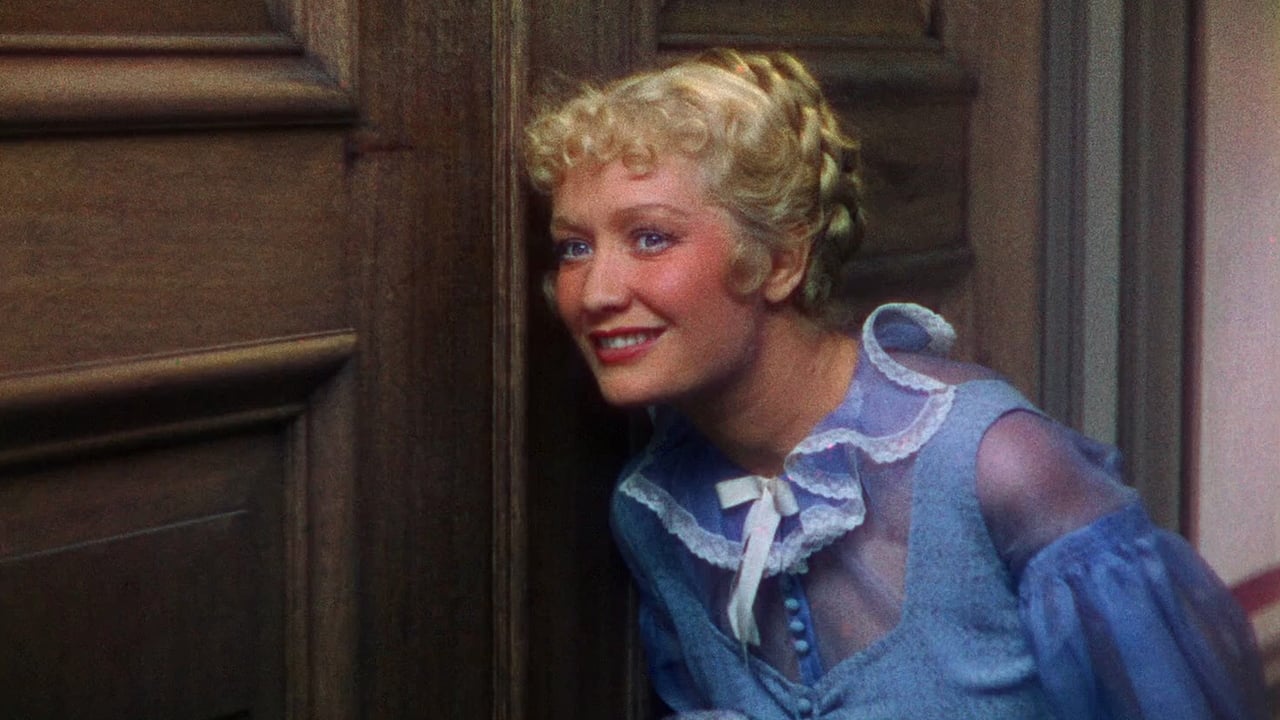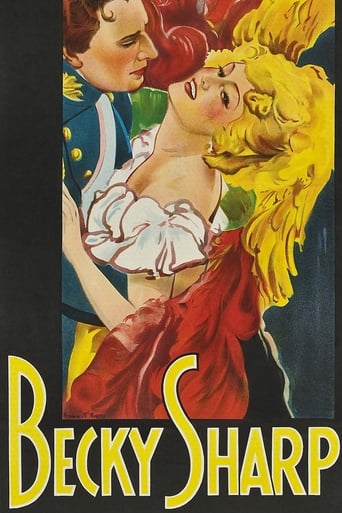lugonian
BECKY SHARP (Pioneer Pictures, released through Radio Pictures, 1935), directed by Rouben Mamoulien, stars Miriam Hopkins in the title role for earned her an Academy Award nomination as Best Actress. Produced at the time where classic literature from famous British novelists as Charles Dickens were brought to life on the motion picture screen, BECKY SHARP, from the famous novel "Vanity Fair" by William Makepeace Thackeray, is most notable mainly for being the first feature film produced entirely in the new and improved Technicolor process. Though Thackeray's Becky Sharp did get produced to the motion picture screen all as "Vanity Fair" in the silent era (1915, 1923), and an early sound modern-dress adaptation for Allied Studios (1932) starring non-other than Myrna Loy of all people, this latest edition may be the best known but one that should have been an another surefire hit to the studio's earlier success of LITTLE WOMEN (1933). At 83 minutes, this screen comedy-drama, centering upon Becky Sharp and her scheming ways of winning affections of wealthy men, does have its good points, especially when Becky lies, cheats and cries convincingly to those listening her sob stories, while all the while she's laughing from inside thinking what a bunch of fools they are. There's a couple of instances where she lets her victims know she's made fools of them and happy about her accomplishment. At one point Becky does make amends to the hurt she's done Amelia, but throughout, Becky retains her ambition as a social climber, no matter what the odds.Set in 19th Century England, and basic "Virtue is its own reward" theme, the story opens with Amelia Sedley (Frances Dee), a popular student among classmates and teachers, leaving the boarding school of Miss Pinkerton's Academy. Also at that school is her closest friend, Becky Sharp (Miriam Hopkins), a not-so-popular girl boarding there as a charity case. As Miss Pinkerton (Elspeth Dudgeon) offers Amelia a going away gift of "Doctor Johnson's Dictionary" as a token of her affection, Amelia surprises everybody by having Becky come home and remain with her until she able to support herself. During the course of time, Becky flirts with Amelia's buffoonish brother, Joseph (Nigel Bruce). When things begin to look serious in their relationship, his father sends him away to India. As Amelia finds herself with two childhood suitors, Captain William Dobbins (Colin Tapley) and George Osborne (G.P. Huntley Jr.), and decision which one to marry, Becky soon lands a position as governess for Pitt Crawley (William Stack) and his unruly children. She agrees to the position upon meeting Captain Random Crawley (Alan Mowbray) of the British Army, who then offers her a new position caring for his rich aunt, Julia (Alison Skipworth), and later another position as his wife. During a society ball hosted by the snobbish Lady Barreacres (Billie Burke), Becky attracts the attention of the Marquis of Steyne (Cedric Hardwicke) who becomes fascinated by her. The function is interrupted by cannon sounds at a distance, where soldiers, including Random, immediately take off to what's to become Napoleon Bonaparte's battle at Waterloo. After the war, problems arise for Becky as Random meets with 500 pound gambling debt, and her husband's suspicions as to how she acquired the large sum of money to help pay off his debts. Other members of the cast include: William Faversham (Duke of Wellington); Charles Richman (General Tufts); Doris Lloyd (Duchess of Richmond); Leonard Mudie (Lloyd Tarquin), among others.A public domain title, BECKY SHARP began circulation on video cassette starting in the early 1980s about the same time when broadcast on cable television stations as Arts and Entertainment (A&E). It wasn't until March 1993 that the fully restored Technicolor BECKY SHARP with RKO Radio logo intact aired on American Movie Classics as part of its film preservation festival, and then a decade later on Turner Classic Movies (TCM premiere: December 2, 2002), and availability onto DVD from various media sources.BECKY SHARP appears to contain only small passages to famous pieces of both book and play, which explains why such notable performers as Alison Skipworth and Billie Burke appearing ever so briefly. Had the movie followed the book closely, chances are BECKY SHASRP might have been close to two hour mark or further in its storytelling. Though Hopkins handles her characterization well, it's a wonder how a natural born British actress like Elsa Lanchester in a rare starring role might have handled it? Aside from colorful costumes and mostly British cast, there's also shadowy images captured on the wall and strong musical background that leave a lasting impression and "virtue is its own reward" for Miriam Hopkins. (***1/2)
missrebeckah
There is a lot of talk about this film and how it compares to the novel, the Broadway play, it's various remakes, and all the hub-bub over the colour. While all of that is interesting, none of it mattered to me before I watched the film. I had just finished watching Myrna Loy as Becky Sharp in the 1932 Vanity Fair, so I was familiar with the story and eager to see this film.This Becky Sharp is an amazing character. Where so much is implied and quieted down with the Myrna Loy version, Miriam Hopkins is brash, loud and daring. She openly insults people and royalty call her "fascinating" for it. She rides higher and higher, with it all culminating one night at a Royal banquet. The battle of Waterloo breaks out and in that moment her world crashes as well.Sometimes I really enjoy watching movies about people living by their wits and using people. At least Becky is beautiful and vivacious. She enlivens many mens' lives and she should be getting something in return for that. Besides scorn, which she got anyway from the ladies. Many people seem to forget how times were so different in the past and the only way a woman had to get ahead in the world was to play the game and "marry up". No one enjoys poverty, so it was natural for a woman to go after as much as she could. Keep in mind that the men encouraged this behavior in women as well. For if it didn't work, women wouldn't have behaved that way. This movie also hints at the hostility between the classes and just how difficult it is to rise above one's station. But Becky gets it very clearly, which is probably why she can work the system so well. Society is shallow and built on appearances. Behind closed doors it's a different world.I enjoyed the film, the characters, the outfits were awesome and I also liked that the film began and ended with Becky throwing a book at someone. That means something. ;) Read more of my reviews of public domain films at: http://pdmoviereview.blogspot.com/
MeYesMe
This is "Gone With the Wind" for people who don't care too much about quality. Miriam Hopkins is cast in the Scarlett role - selfish, social-climbing, with no compunctions about using people at whim. The difference is that Scarlett eventually learns her lesson and we have hope, at the end of the story, that she'll live according to the knowledge she's acquired. At the end of THIS story - we're positive that Becky's going to eventually end up in hell, and good riddance. Becky's a manipulative brat who rises to the top, comes crashing down and is eager to start the cycle again.Although it's historically important as the first feature length movie shot in three colors, that's not nearly enough to recommend it. Hopkins, usually an emotional involving actress, comes off overwrought and broad - like she's acting in a silent movie and someone hit the sound switch without telling her.

